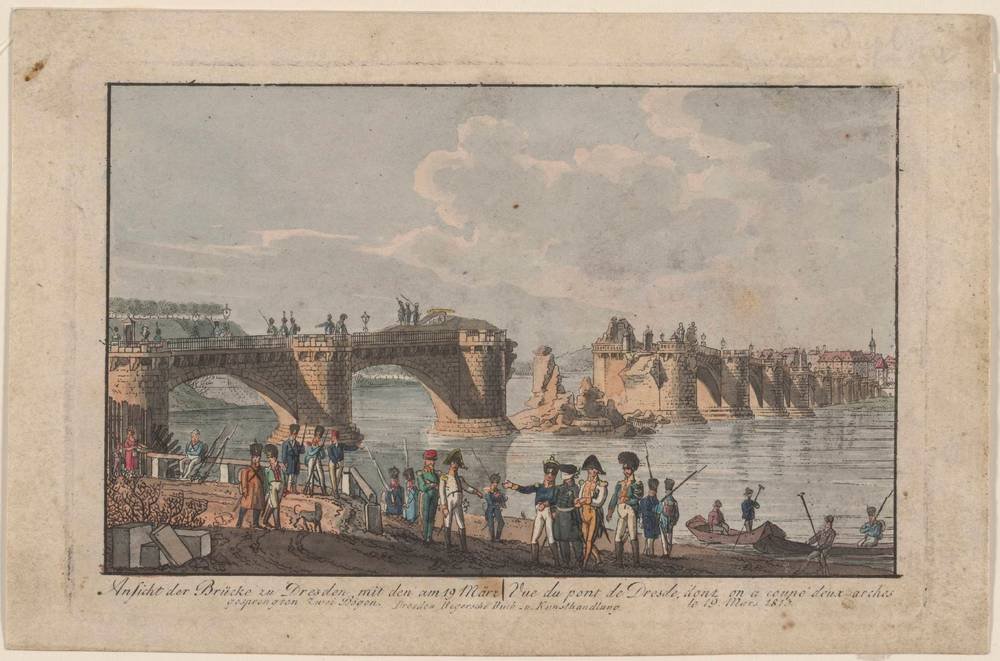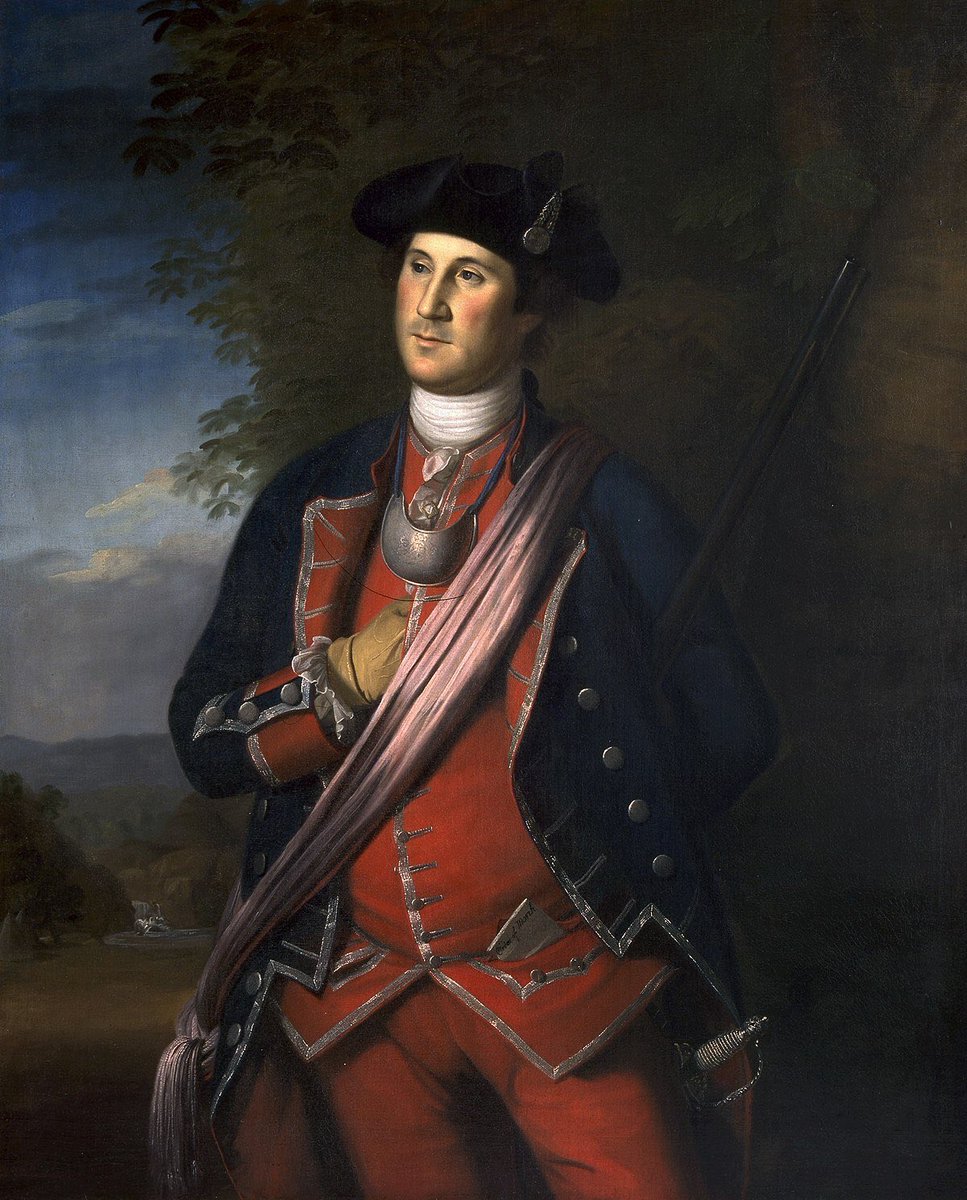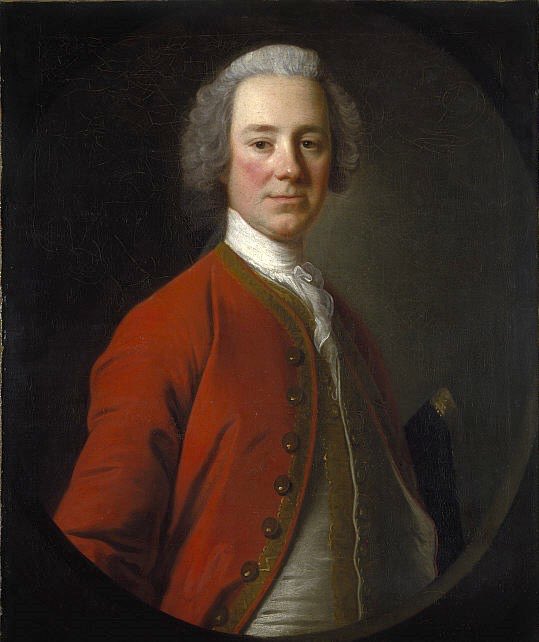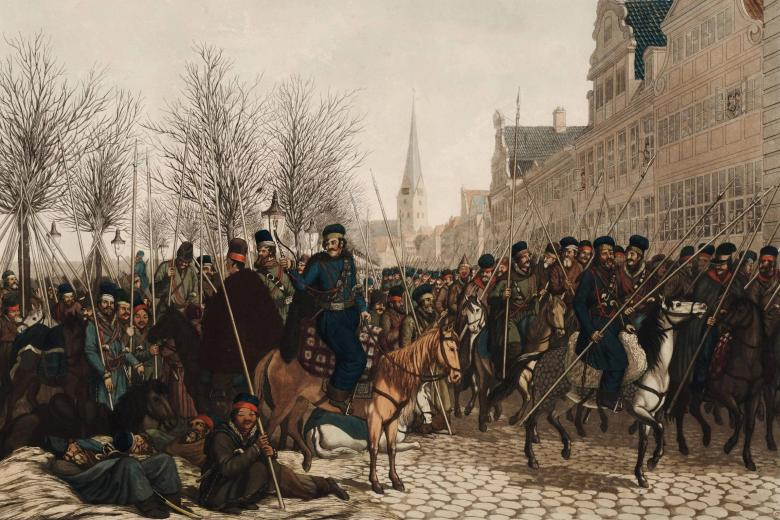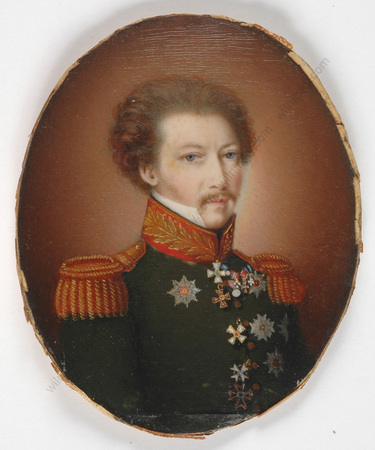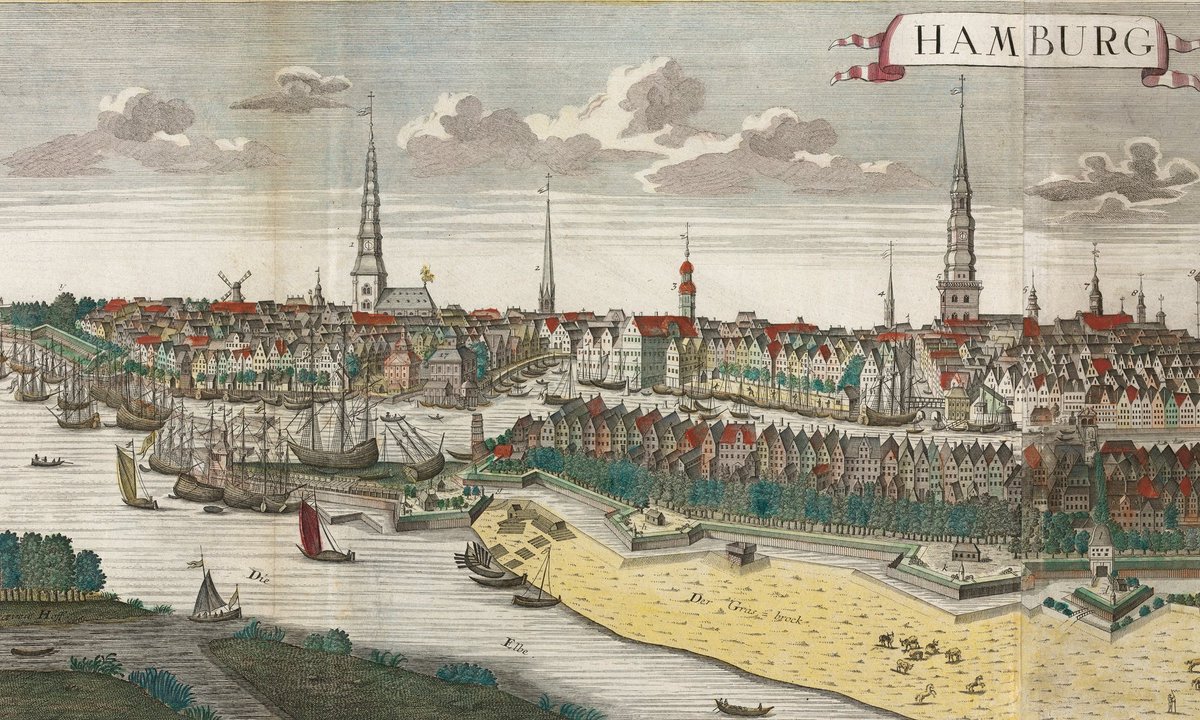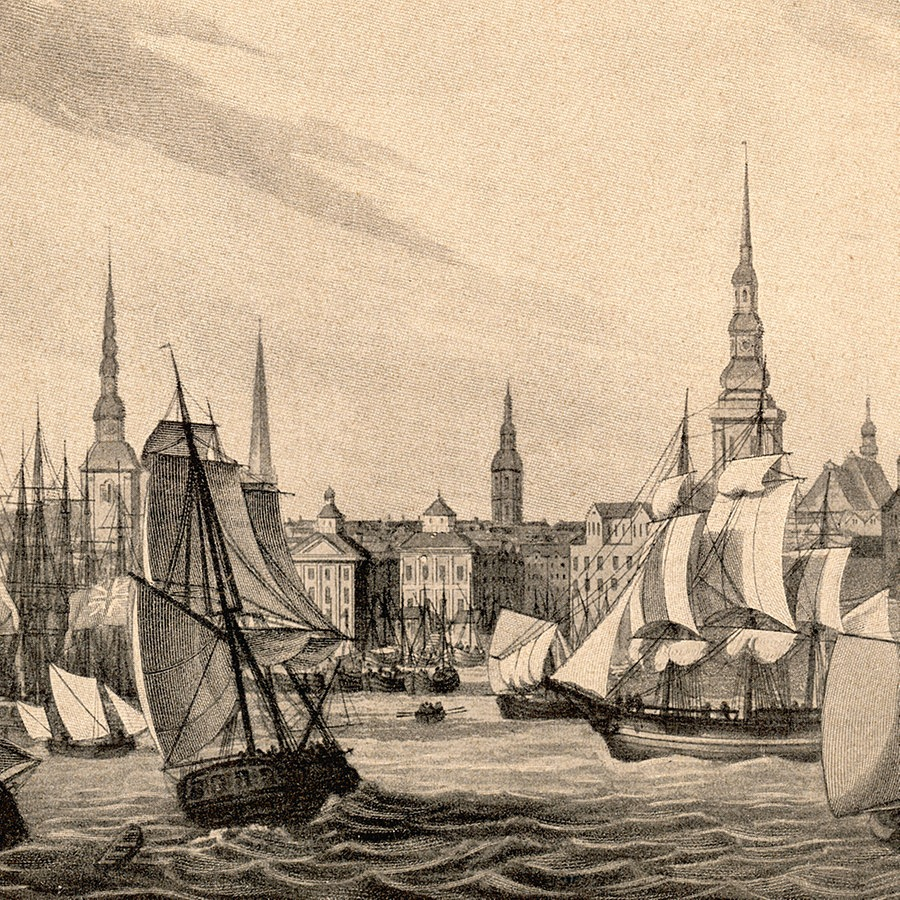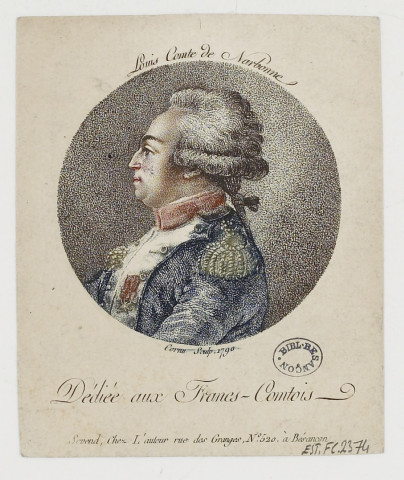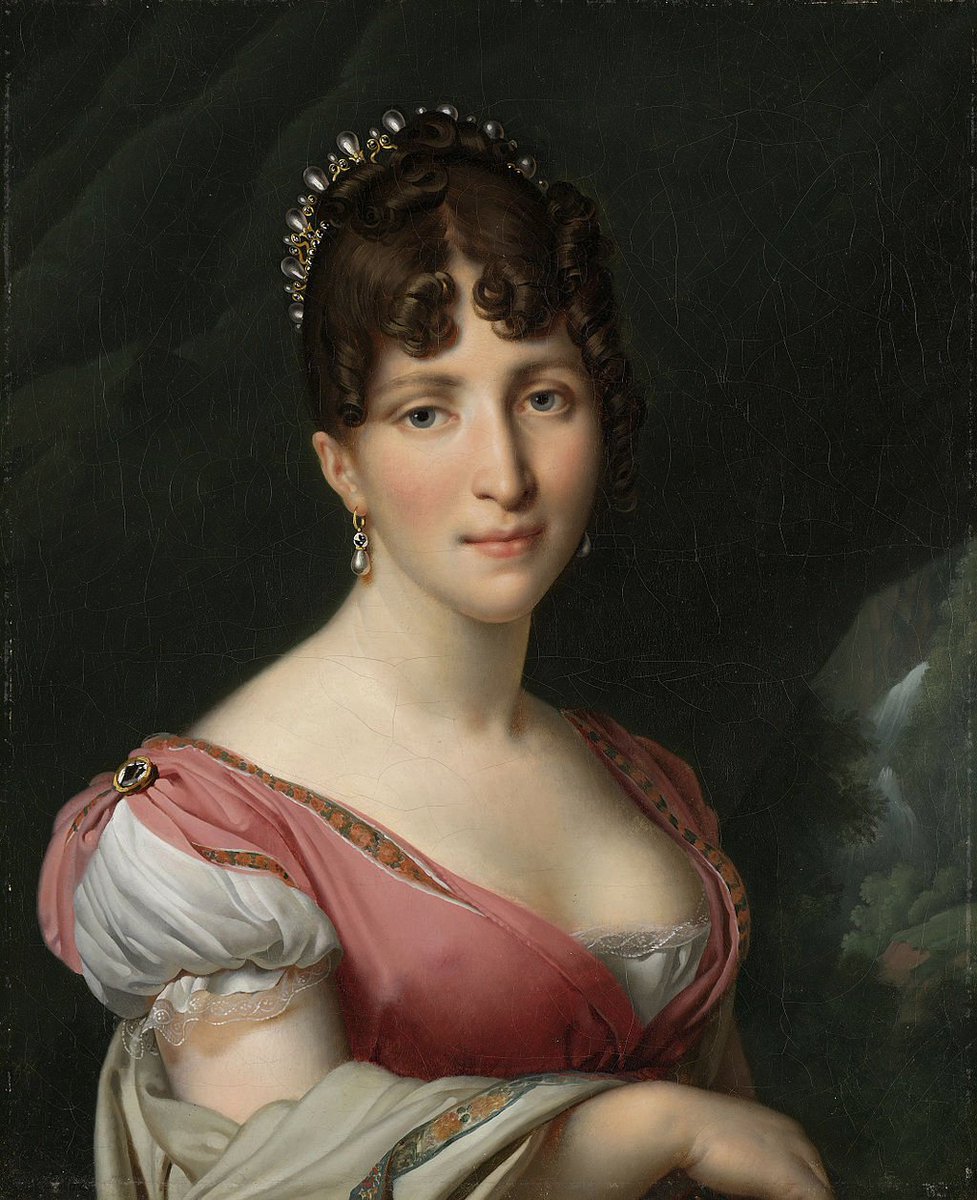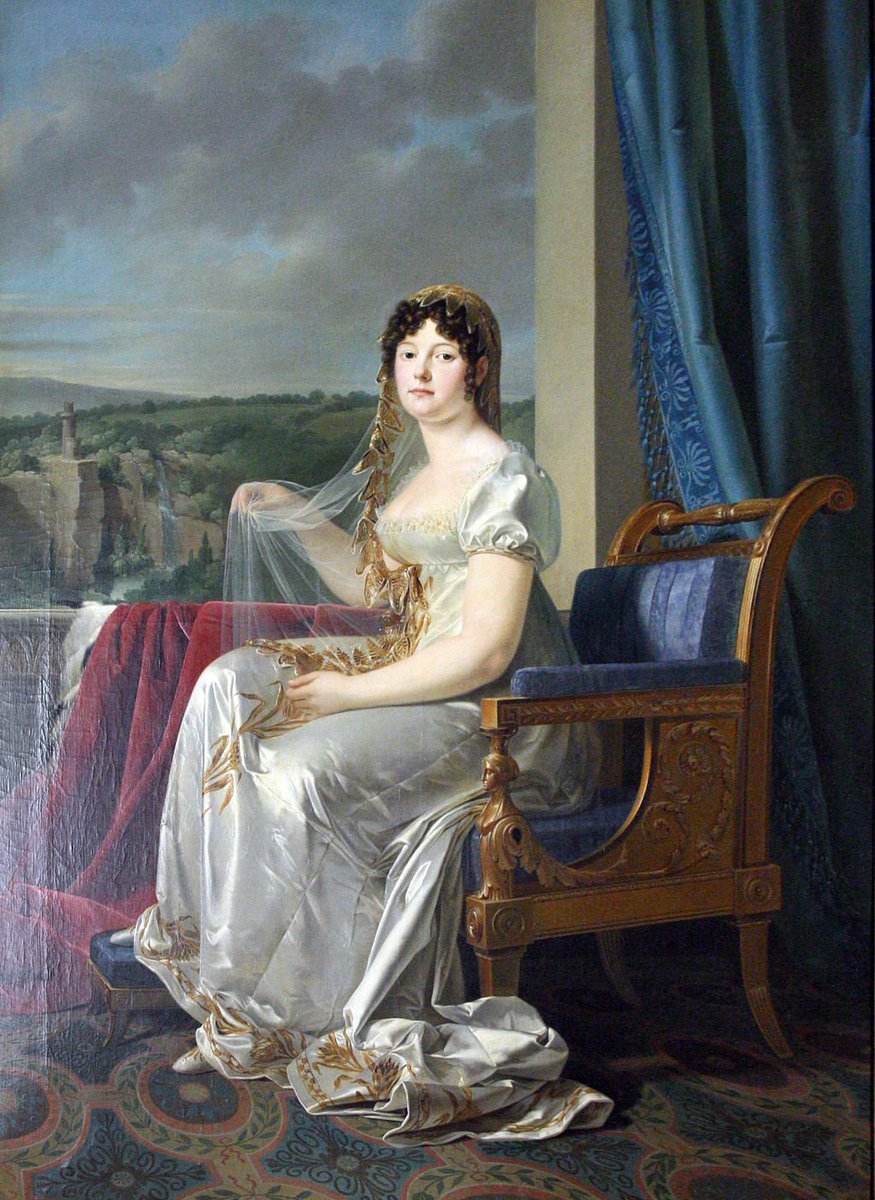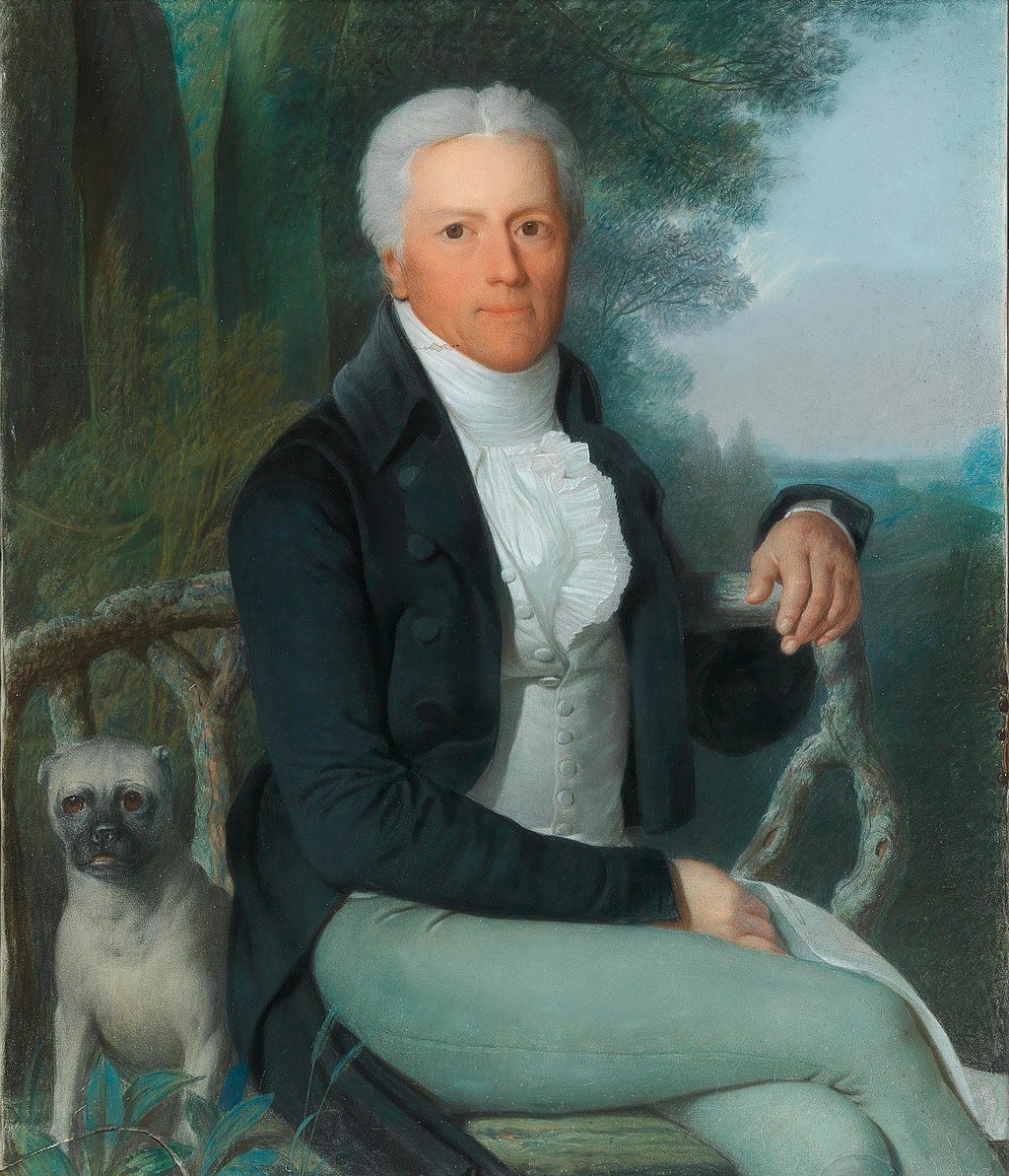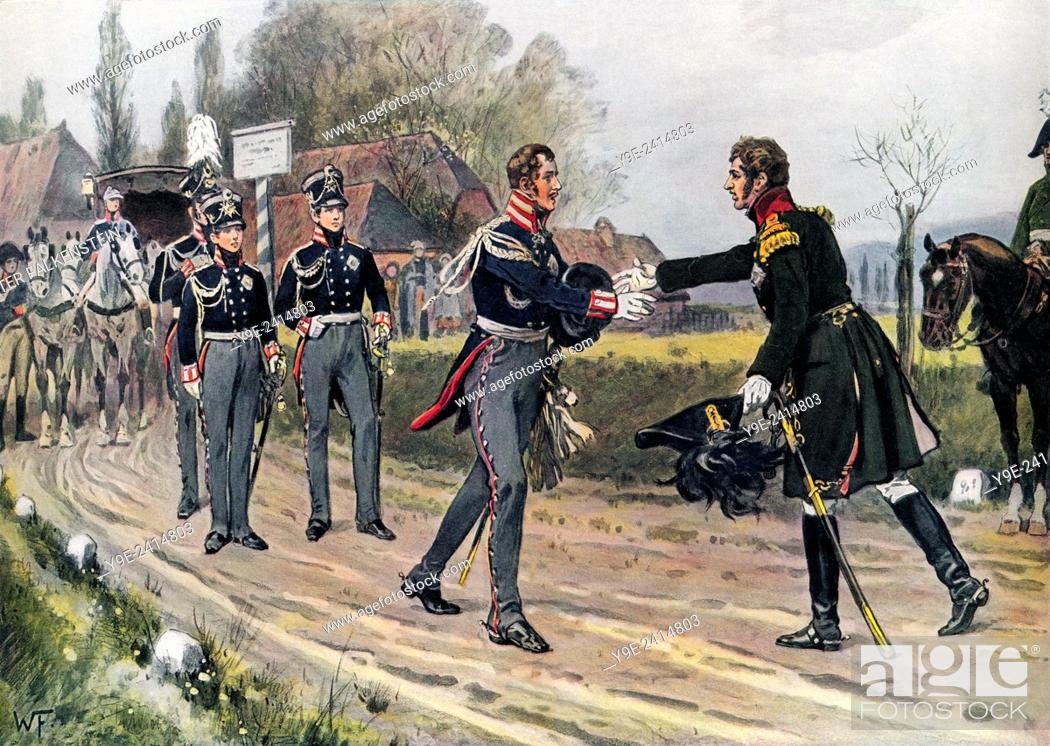
#OTD #Onthisday 17 March, 1813, King Frederick William III of Prussia issued "Au Mein Volk," a groundbreaking appeal to all the ethnic Germans to take up arms for the war of liberation from France.
Yorck, on the day of the his final verdict, entered Berlin in triumph.


Yorck, on the day of the his final verdict, entered Berlin in triumph.
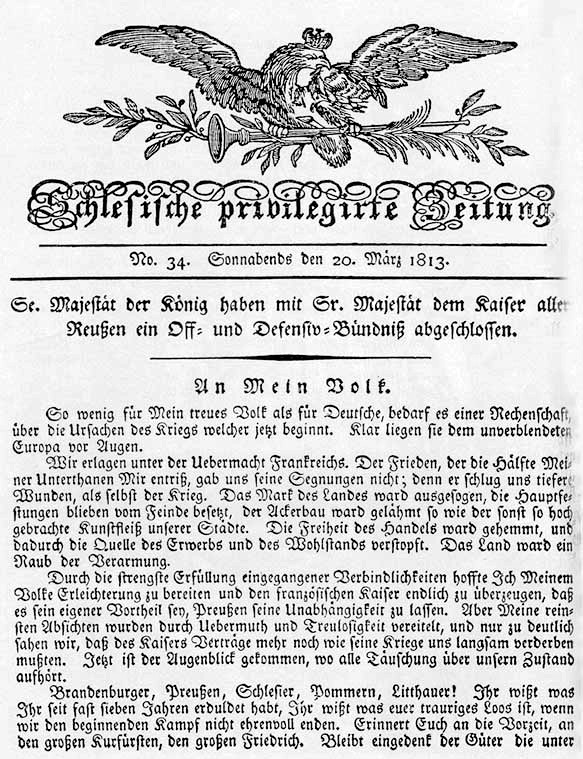
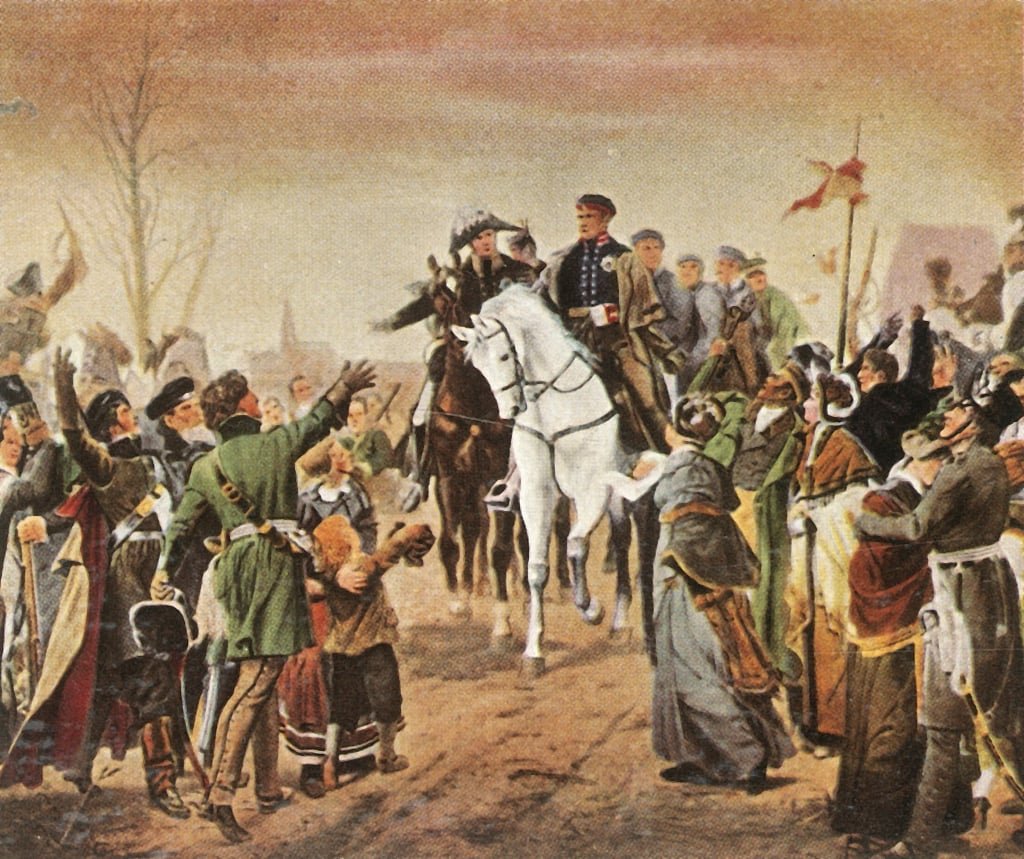
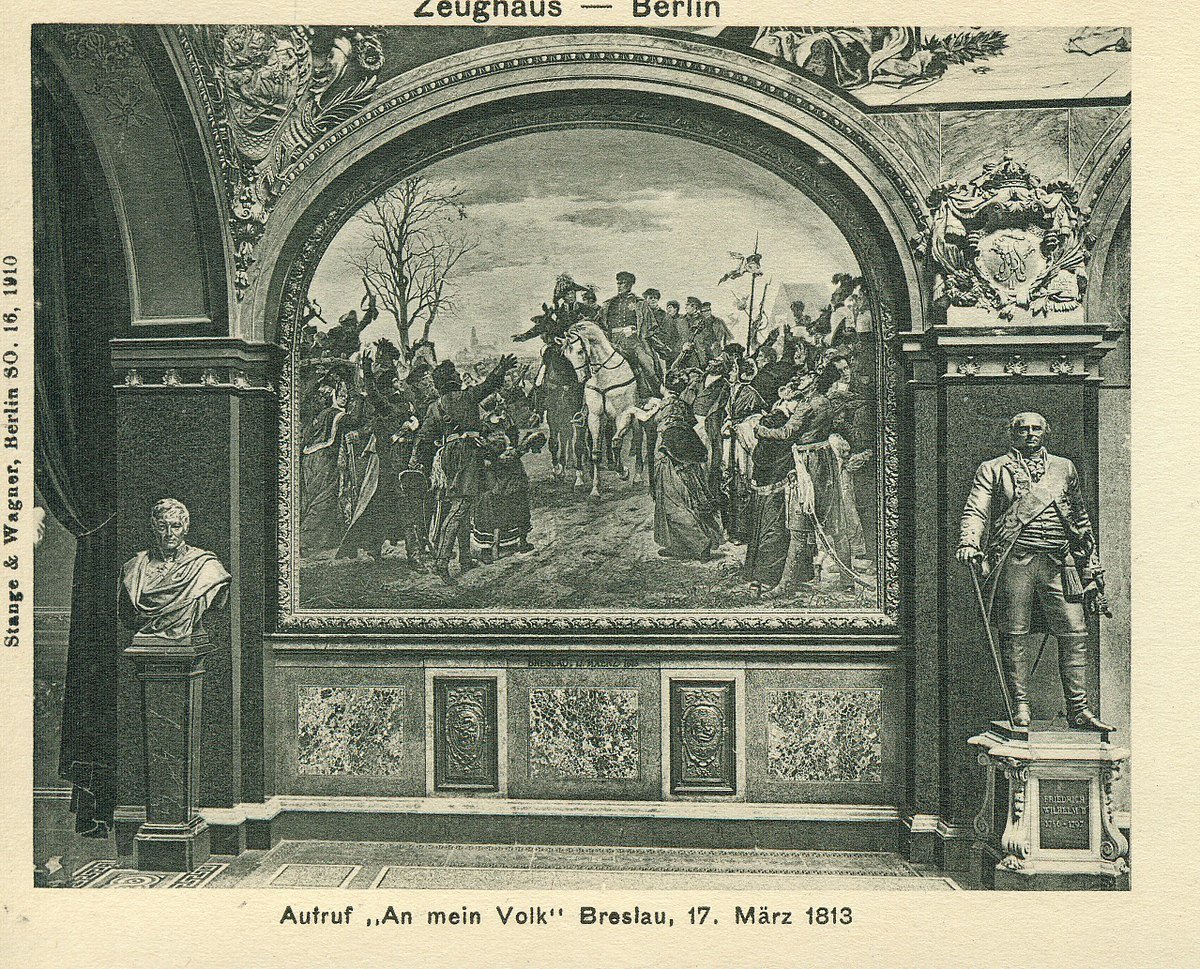
In the high politics, the discourse of pan-German liberation was not unfamiliar to the Confederation of the Rhine. Hardenberg singled out Saxony as the only state in the Confederation still subservient to Napoleon and therefore equally subject to retribution.
The Lützow Freikorps had even attempted to carry a flag of German liberation in place of a Prussian one, which Frederick William, then in fear of eliciting suspicions and suppressions from Napoleon, strictly forbade.
(Poultney Bigelow)
(Poultney Bigelow)
The idea of a German versus solely Prussian activism gradually seeped into the discussion among the leading intellectuals. A prominent example is Ardnt's thesis, "What is the meaning of Landstrum and Landwehr? (Was bedeutet Landsturm und Landwehr?)". 
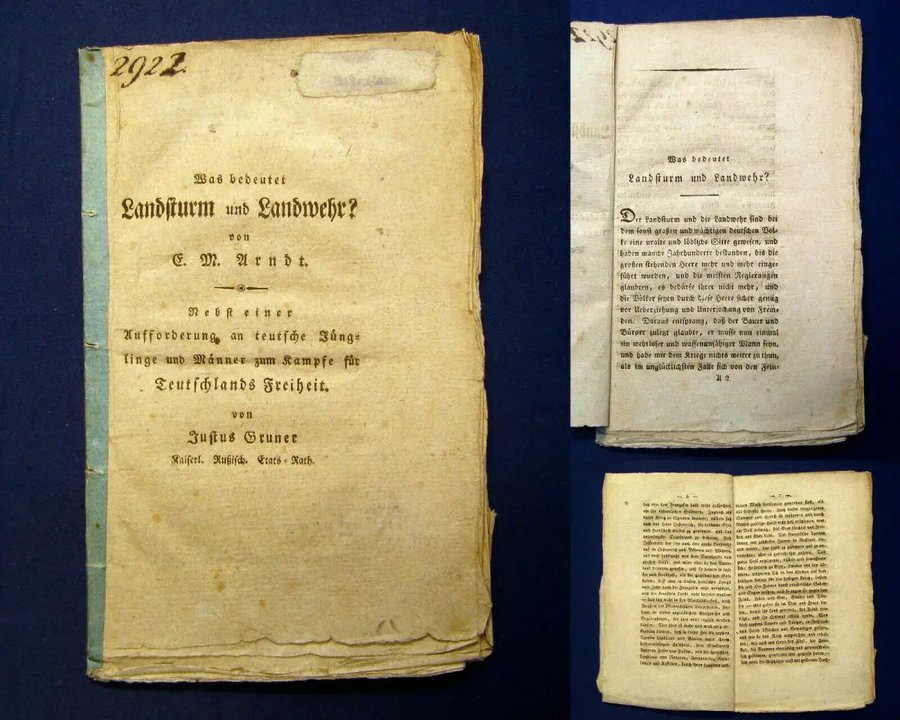
Later dubbed 'the Father of Germany,' Arndt alluded to a historical parallel between the German resistance against the Roman Empire and the current struggle against Napoleon.
Student activism in German universities shows that such zeitgeist was not confined to Prussia.

Student activism in German universities shows that such zeitgeist was not confined to Prussia.
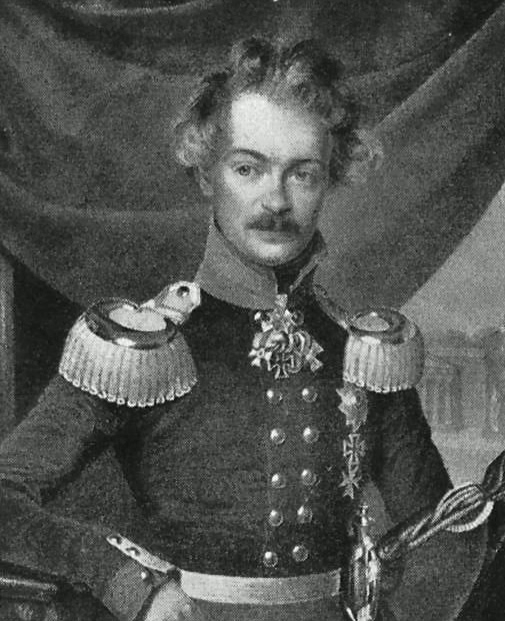
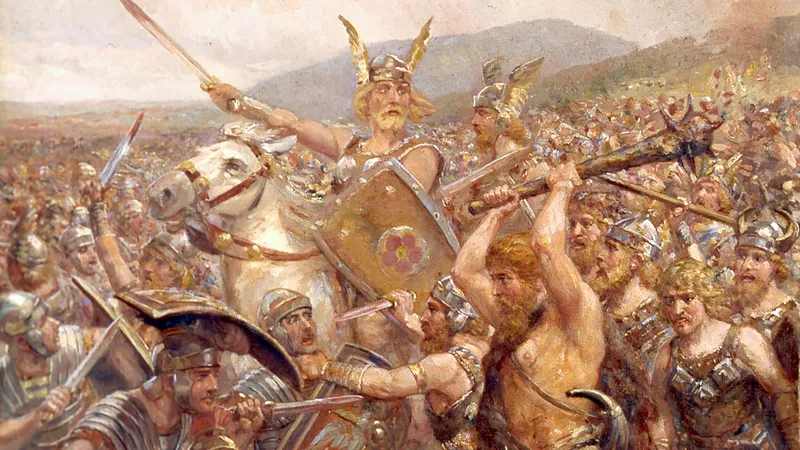
On this day, university students in Mecklenburg submitted a memorandum addressing the Duke of Mecklenburg, requesting their enrollment in a volunteer army. Even in Saxony, young dissidents openly attempted to hamper Davout and Reynier's operations.
(Forster)
(Forster)
However, because the concept of nationalism was yet to permeate Europe, those discussions of German liberation lacked a tangible center for an ethno-national cohesion. In this context, "Au Mein Volk" served as the forerunner to the modern state heads' appeal to solidarity: 
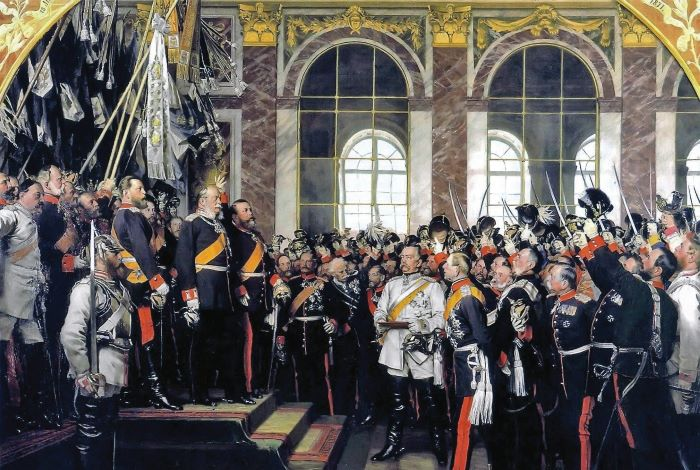
"There is no need of explaining to my loyal subjects or to any German, the reasons for the war which is about to begin. They lie plainly before the eyes of awakened Europe.
We succumbed to the superior force of France. The peace which followed deprived me of my people and,
We succumbed to the superior force of France. The peace which followed deprived me of my people and,
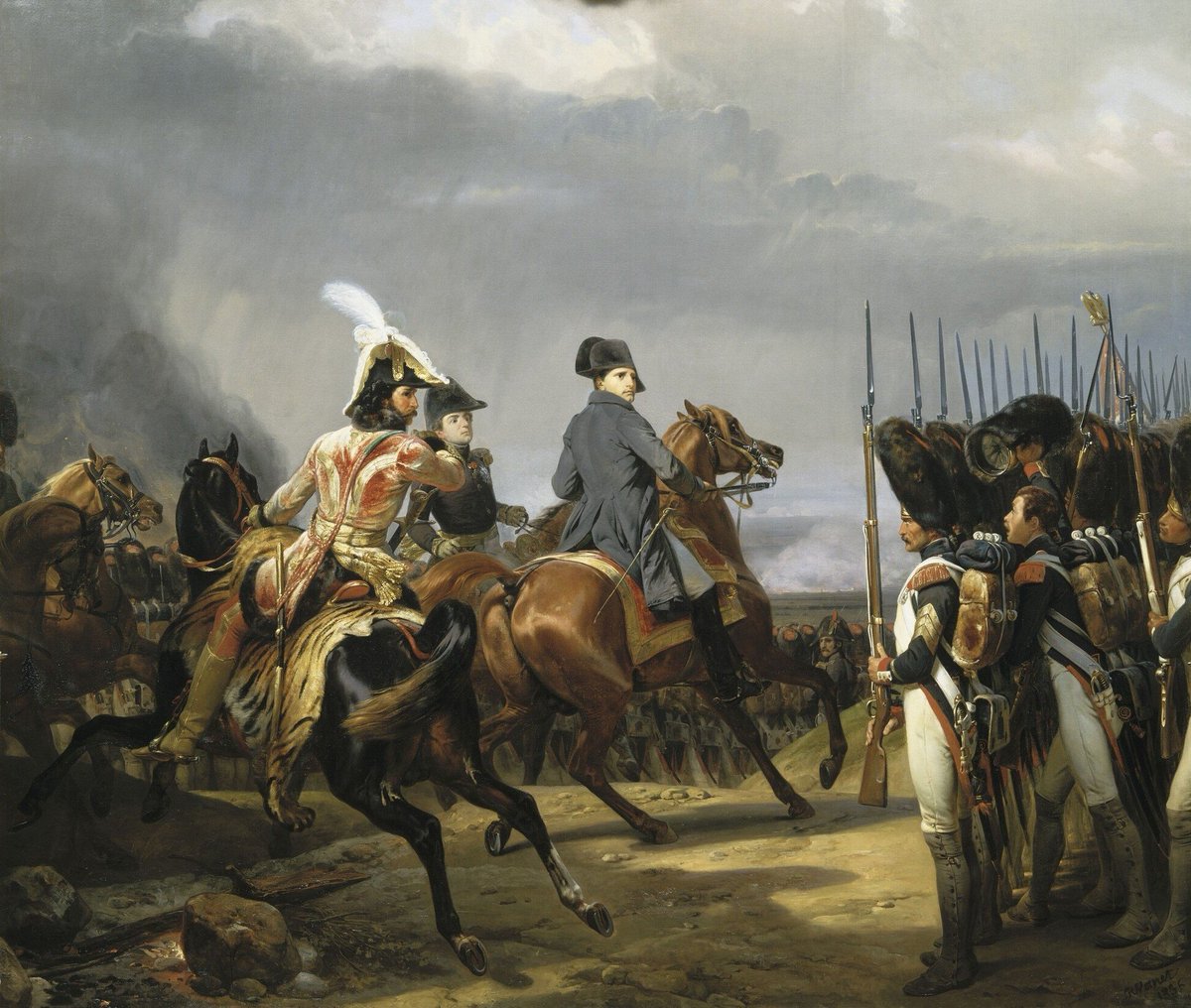
far from bringing us blessings, it inflicted upon us deeper wounds than the war itself, sucking out the very marrow of the country. Our principal fortresses remained in the hand of the enemy, and agriculture, as well as the highly developed industries of our towns, was crippled.
The freedom of trade was hampered and thereby the sources of commerce and prosperity cut off. The country was left a prey to the ravages of destitution.
I hoped, by the punctilious fulfillment of the engagements I had entered into, to lighten the burdens of my people,
I hoped, by the punctilious fulfillment of the engagements I had entered into, to lighten the burdens of my people,
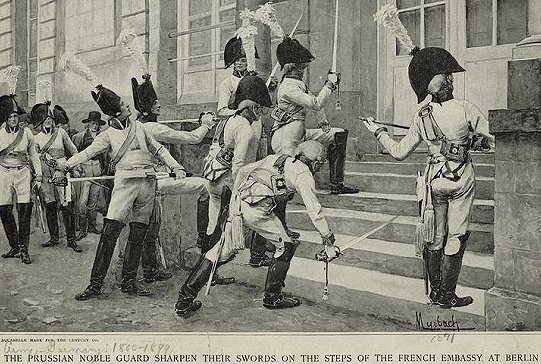
and even to convince the French emperor that it would be to his own advantage to leave Prussia her independence. But the purest and best of intentions on my part were of no avail against insolence and faithlessness, and it became only too plain that
the emperor's treaties would gradually ruin us even more surely than his wars. The moment is come when we can no longer harbor the slightest illusion as to our situation.
Brandenburgers, Prussians, Silesians, Pomeranians, Lithuanians!
Brandenburgers, Prussians, Silesians, Pomeranians, Lithuanians!
You know what you have borne for the past seven years; you know the sad fate that awaits you if we do not bring this war to an honorable end. Think of the times gone by, – of the Great Elector, the great Frederick! 
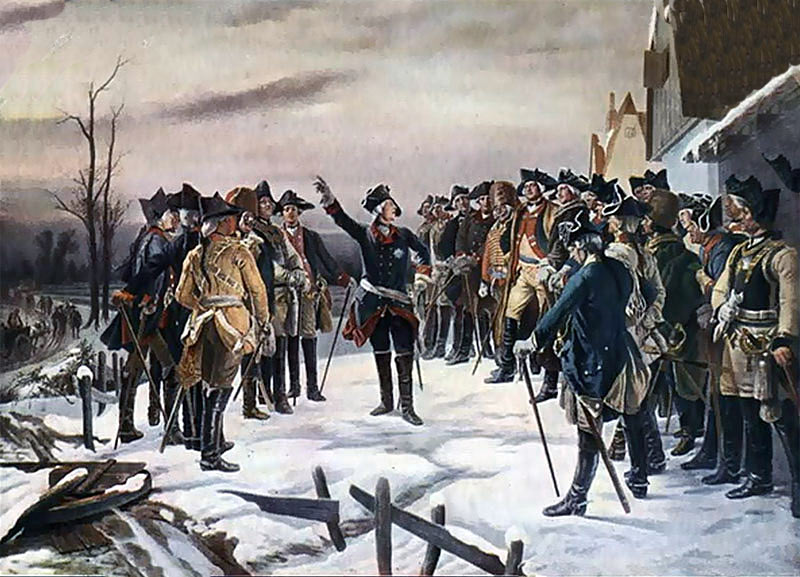
Remember the blessings for which your forefathers fought under their leadership and which they paid for with their blood, – freedom of conscience, national honor, independence, commerce, industry, learning. Look at the great example of our powerful allies, the Russians; 
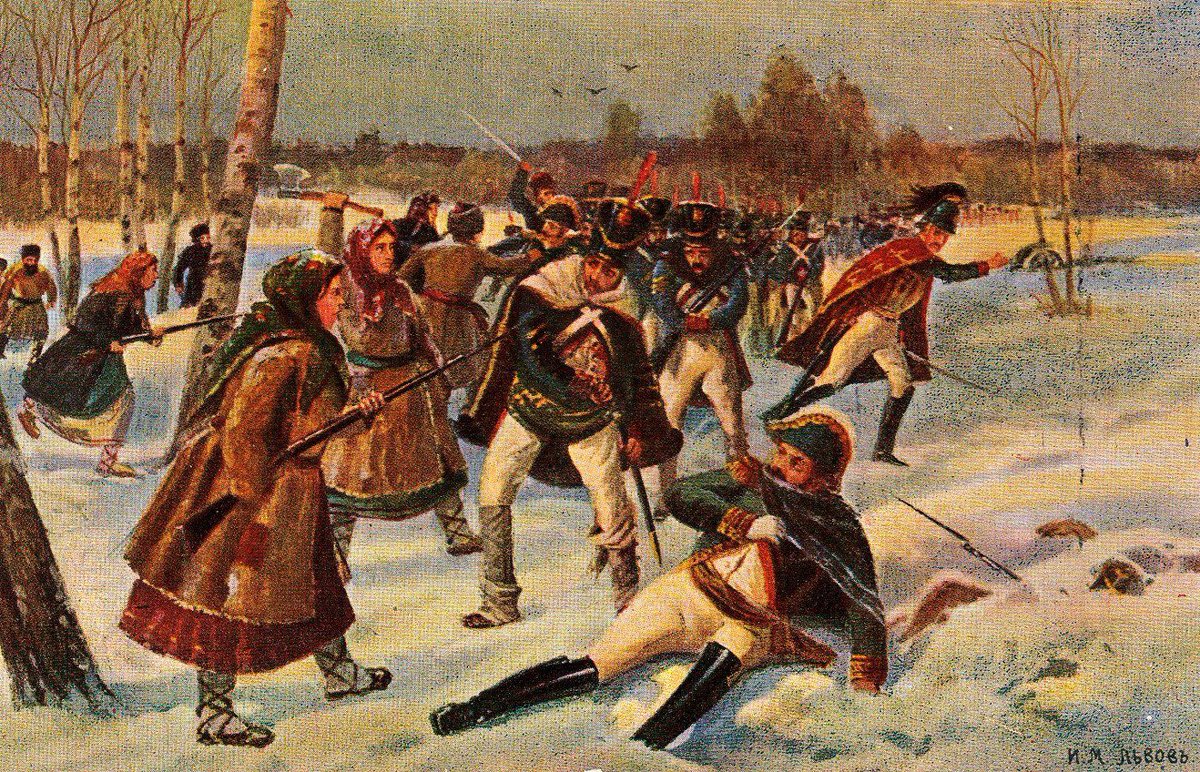
look at the Spaniards the Portuguese. For such objects as these even weaker peoples have gone forth against mightier enemies and returned in triumph. Witness the heroic Swiss and the people of the Netherlands."
(Frederick William III, 17 March 1813; GHDI)
(Frederick William III, 17 March 1813; GHDI)
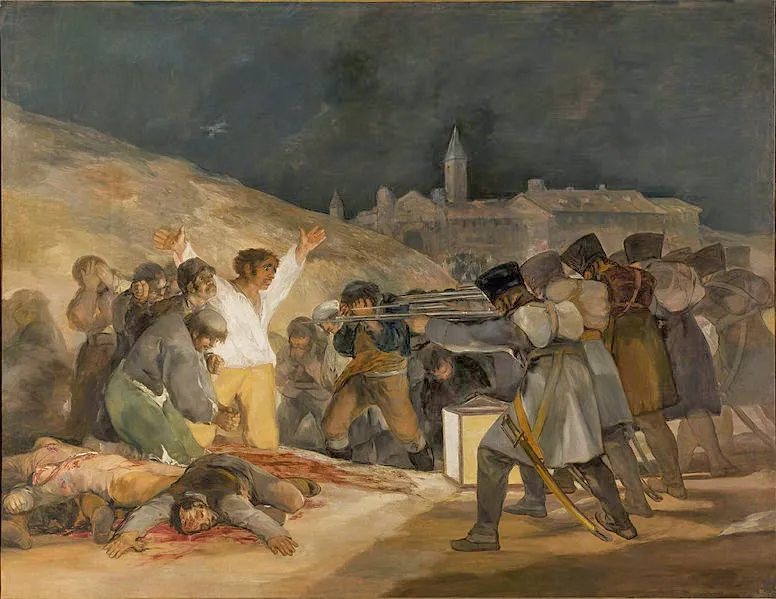
The proclamation was revolutionary in that it not only addressed not only those within the Confederation but also all the ethnic Germans in Europe. By embracing them with the legacy of Frederick the Great, the king officially declared an ethno-national crusade against France.
Although not acknowledged by Frederick William, his words also revived the spirit of Tugenbund (the League of Virtue), a secret society formed in 1808 by anti-French intellectuals, statesmen, and a minority of middle-class townsmen.
Having incited spordic riots against the French, it became suppressed by Napoleon, Stein, and Frederick William alike. Althogh disbanded in 1810, the masonic society was outlived by its spirits, for the architects of 'Au Mein Volk' strived to emit as much Germanness as possible. 
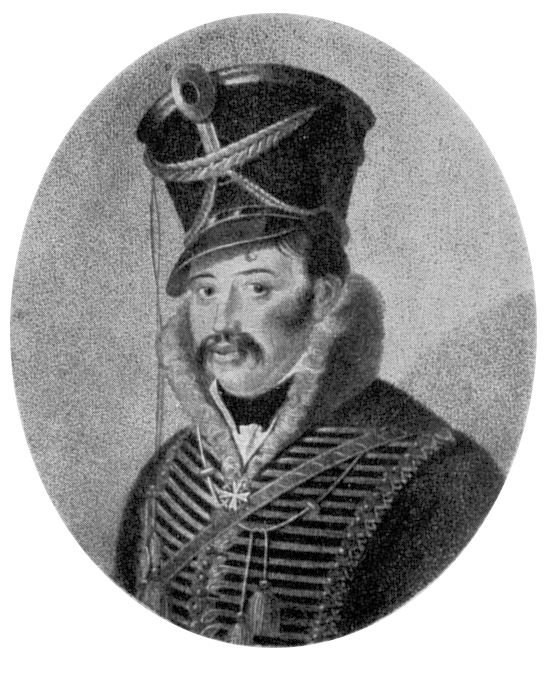
After the initial draft proposed by Ancillon was deemed too circumstantial, Scharnhorst, Gneisenau, Thiele, Hippel, and Jordan secluded themselves in Hardenberg's quarters for a week. They aimed for "Dazzling phrases," "German in character," to express "repressed feelings."
St. Marsan, who, at this point, had nothing more to be shocked at, jeered as Hardenberg showed him a copy:
"Is this it? I expected them to issue a much stronger justification."
But inside, he realized that the situation in Germany was no longer within his control.
(Leggiere)
"Is this it? I expected them to issue a much stronger justification."
But inside, he realized that the situation in Germany was no longer within his control.
(Leggiere)
Attaching the official notice of the Treaty of Kalisch, handed by Hardenberg a day ago, he informed Maret of how Prussia had come to reach the point of no return:
"Emperor Alexander arrived here on the 15th, at 5 p.m. At the moment when I was about to leave for Paris,
"Emperor Alexander arrived here on the 15th, at 5 p.m. At the moment when I was about to leave for Paris,
the courier carrying this news, the one that your Excellency sent me on March 6, gave me your dispatches from the same day. I had just written to the Baron de Hardenberg, to ask him for an interview in order to inform him of the favorable dispositions of His Majesty [Napoleon],
when I received the attached note, which is a formal declaration of war. I hasten to bring it to the knowledge of the emperor."
(Fain)
This was not the end, for Frederick William would issue two additional decrees; one for the current army and another for the Landwehr.
(Fain)
This was not the end, for Frederick William would issue two additional decrees; one for the current army and another for the Landwehr.
The first, titled 'Au Mein Kriegsheer (To My Army'), read:
"Many times you have expressed the desire to fight for the freedom and independence of the Fatherland. The moment has come! There is not one among the ranks of the people who does note feel this.
"Many times you have expressed the desire to fight for the freedom and independence of the Fatherland. The moment has come! There is not one among the ranks of the people who does note feel this.
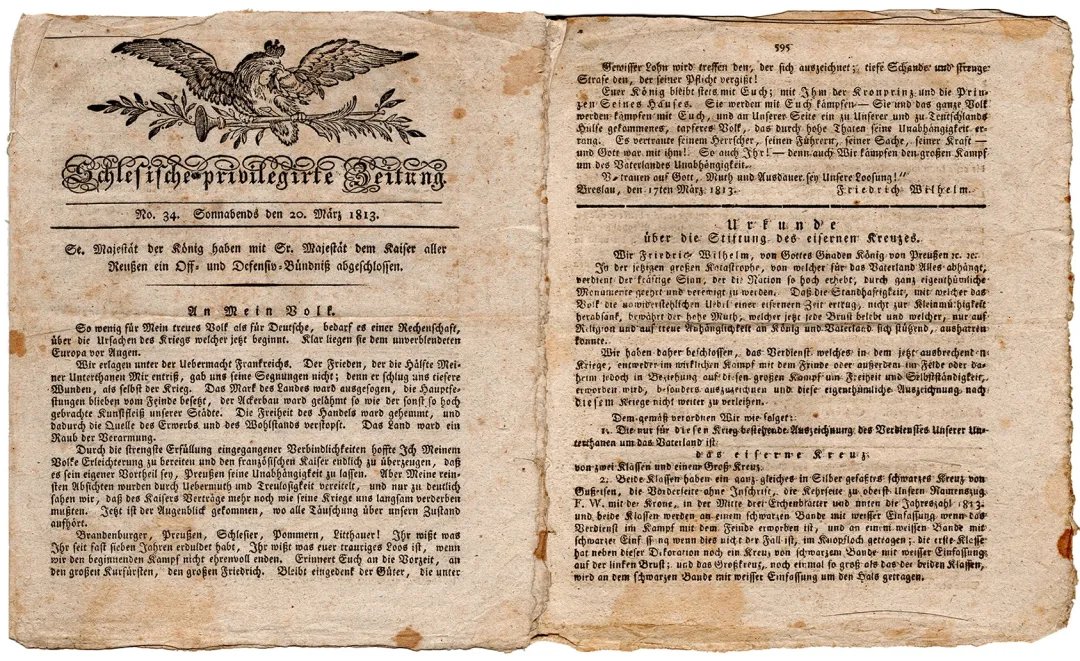
The king maintained that all should subsume their individual ambitions and rank into a common devotion for God, the land of their noble forefathers, and the king. The Russians, "a brave people...who through noble deeds have won their independence," would fight by their side.
The second, titled "Ordonnance on the Organization of the Landwehr," addressed the Prussian conscripts, and therefore was more local in its scope of address:
"...that God offers his special protection to the people who defend their fatherland with unconditional trust
"...that God offers his special protection to the people who defend their fatherland with unconditional trust
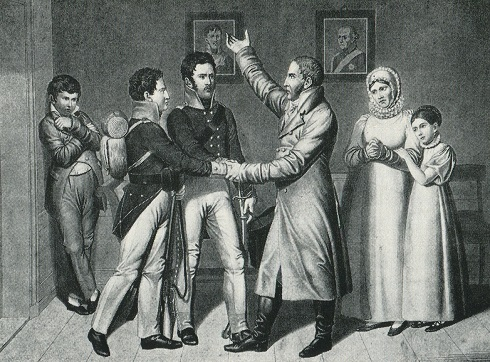
in their ruler with steadfastness and strength against foreign oppression.
Prussia! Worthy of the name, you share this feeling! You too cherish the desire to free yourselves from foreign pressure."
Another factor emphasized was patriotism shared across all ages and classes.
Prussia! Worthy of the name, you share this feeling! You too cherish the desire to free yourselves from foreign pressure."
Another factor emphasized was patriotism shared across all ages and classes.
It can be said that it confirmed the resolution of the previous debate in the Armaments Committee over the scope of conscription, concerning the maximum age and occupations worthy of exemption.
"...I become aware of the evidence of this from the eagerness,
"...I become aware of the evidence of this from the eagerness,
with which the young men from all classes take up arms and place themselves under the banners of my army; in the readiness with which mature men, full of contempt for danger, offer themselves for service; and in the sacrifices with which all classes, age and age, compete,
to display their love of the fatherland.
...These warriors will fight for our independence and for the honor of the people. But both will be secured only if every son of our fatherland shares this fight for freedom and honor!"
(Leggiere; Schon)
...These warriors will fight for our independence and for the honor of the people. But both will be secured only if every son of our fatherland shares this fight for freedom and honor!"
(Leggiere; Schon)
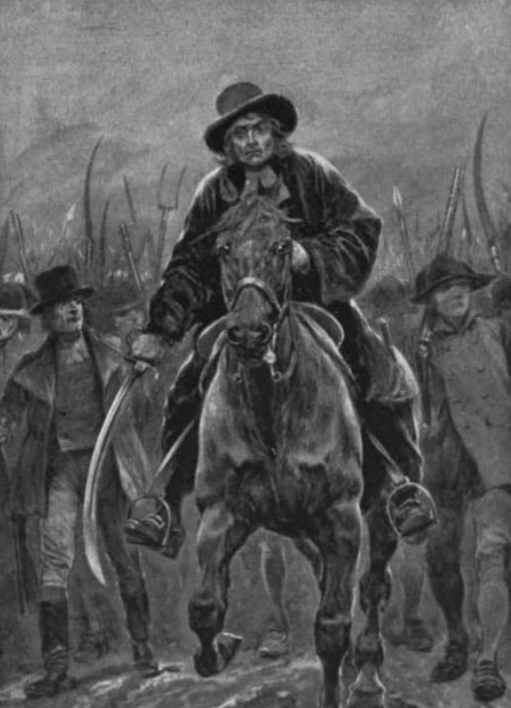
Universal devotion to the sovereign and the state was to transcend every social strata. The four military districts, which Prussia has been divided into on the 16th, were charged with administering and mobilizing the new conscripts of the Landwehr.
(Leggiere)
(Leggiere)
Frederick William officiated all of the documents alongside that creating the Iron Cross, drafted earlier on the 10th. It was the moment which his two months of sojourn in Breslau culminated in.
This auspiciously coincided with Yorck's entry in Berlin after the final verdict.
This auspiciously coincided with Yorck's entry in Berlin after the final verdict.
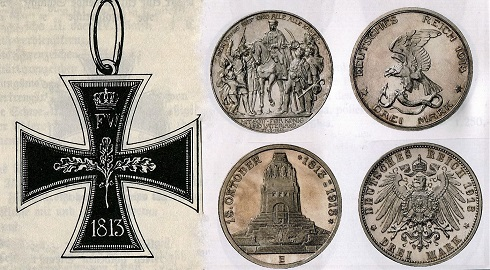
Although the king had twice publicized his acquittal, the official verdict finally sealing everything was released on the day. A committee consisting of General-Lieutenant von Dierike and the General-Majors von Sanit and von Schüler declared his innocence.
(Forster)
(Forster)
Leaving early in the morning, Yorck, as if echoing the king's proclamations, announced the official termination of war with Russia.
Just like the Prussian envoys anticipating Alexander's arrival on the 15th, Wittgenstein's suite rode up toward Weißensee.
Just like the Prussian envoys anticipating Alexander's arrival on the 15th, Wittgenstein's suite rode up toward Weißensee.
It was composed of Prince Heinrich, brother to Frederick William, Wittgenstein, and Repnin, now the temporary governor of Berlin. Halfway to Weißensee, they saw Yorck's corps, after which each greeted their hero with the most cordial of handshakes. 


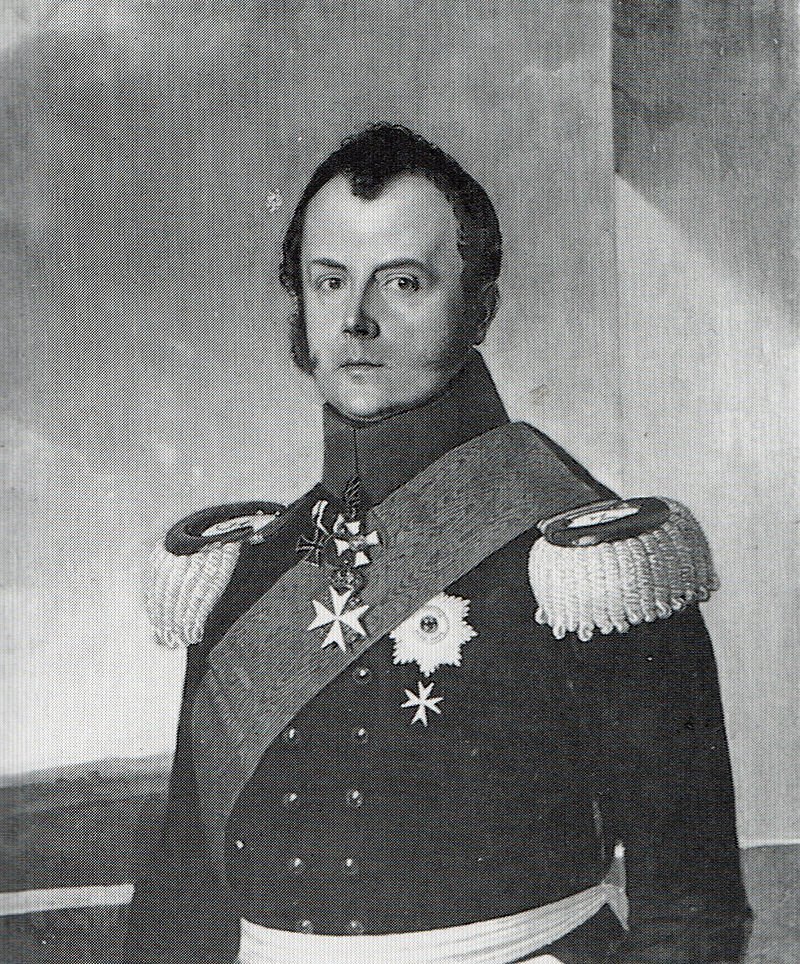
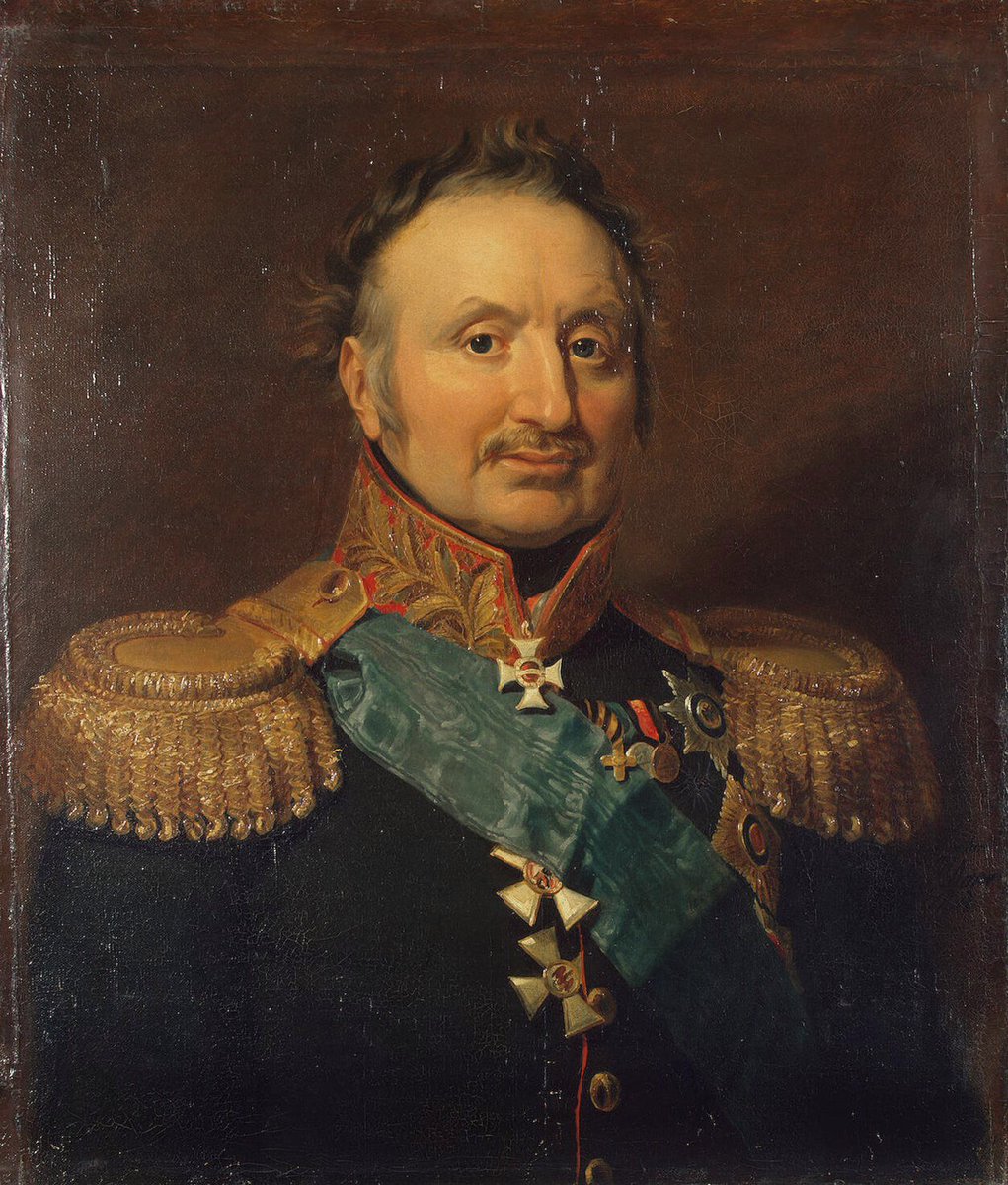
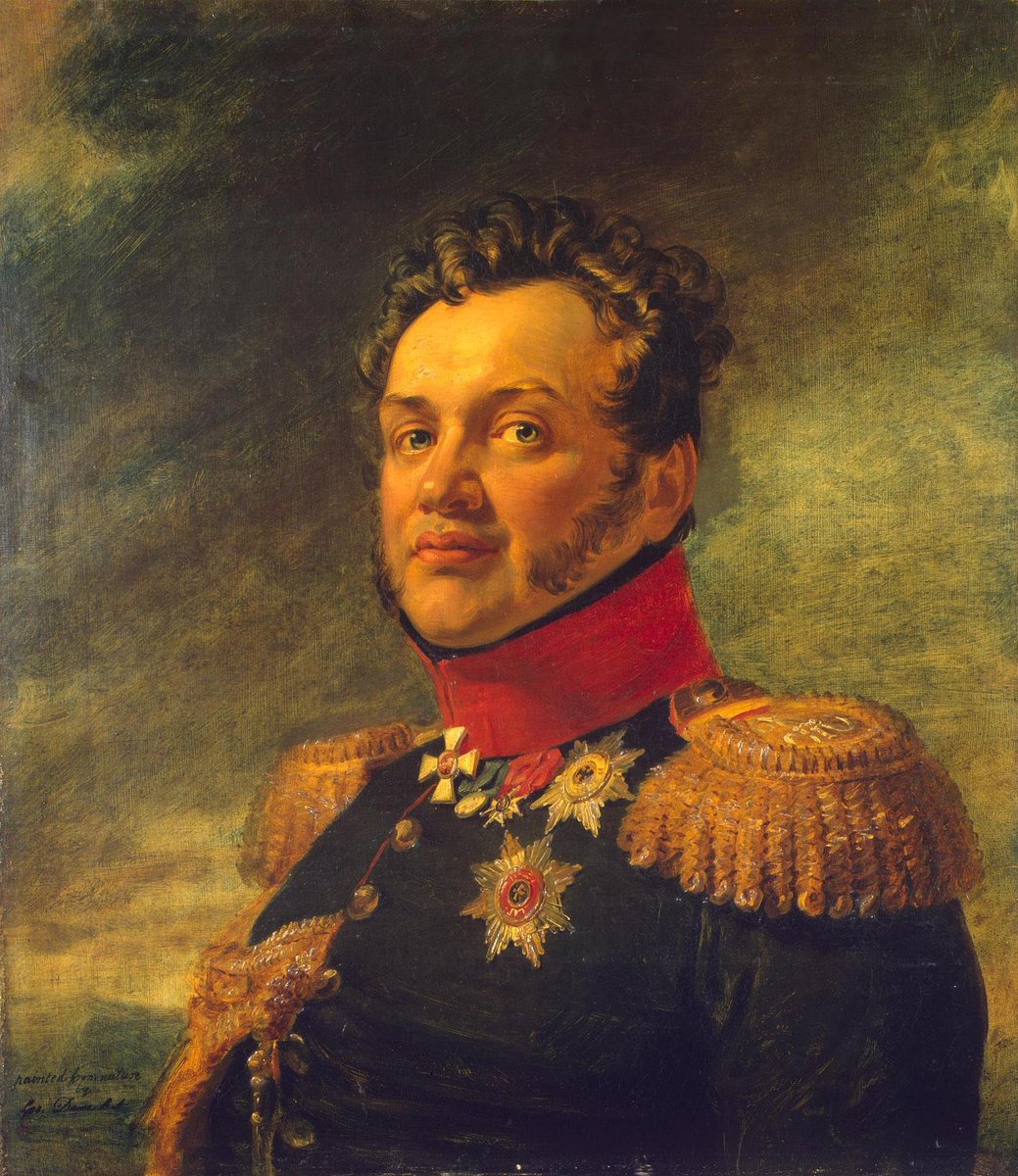
Behind them were the splendidly dressed staff officers of the National Guard. Together, they galloped in the direction of Berlin.
The glittering procession approached the King's Gate, by each side of which gendarmes and hundreds of chasseurs of the Berlin militia were lined up.
The glittering procession approached the King's Gate, by each side of which gendarmes and hundreds of chasseurs of the Berlin militia were lined up.
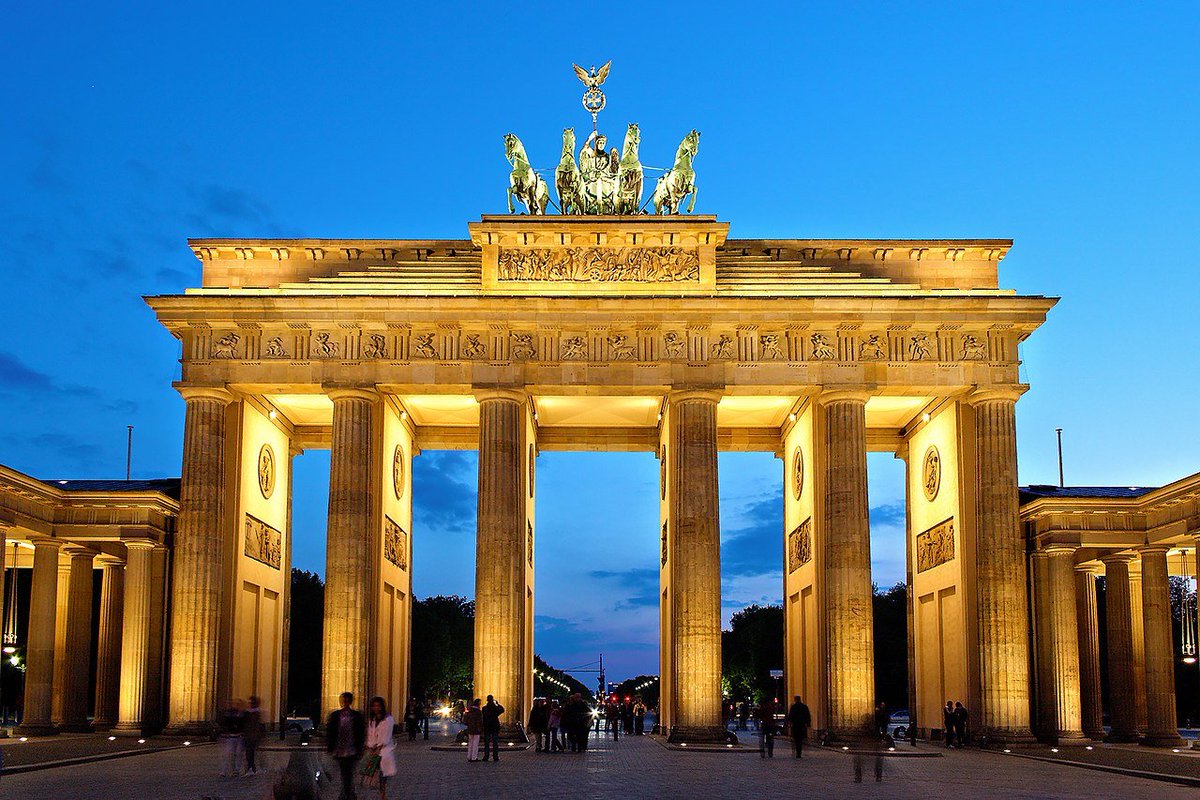
Those fresh volunteers rode up towards the entourage and escorted them to the capital.
The first to enter the gate was the entire cavalry under Cornswandt, consisting of eight squadrons of Silesian hussars and eight of Lithuanian, West Prussian, and Brandenburger dragoons.
The first to enter the gate was the entire cavalry under Cornswandt, consisting of eight squadrons of Silesian hussars and eight of Lithuanian, West Prussian, and Brandenburger dragoons.
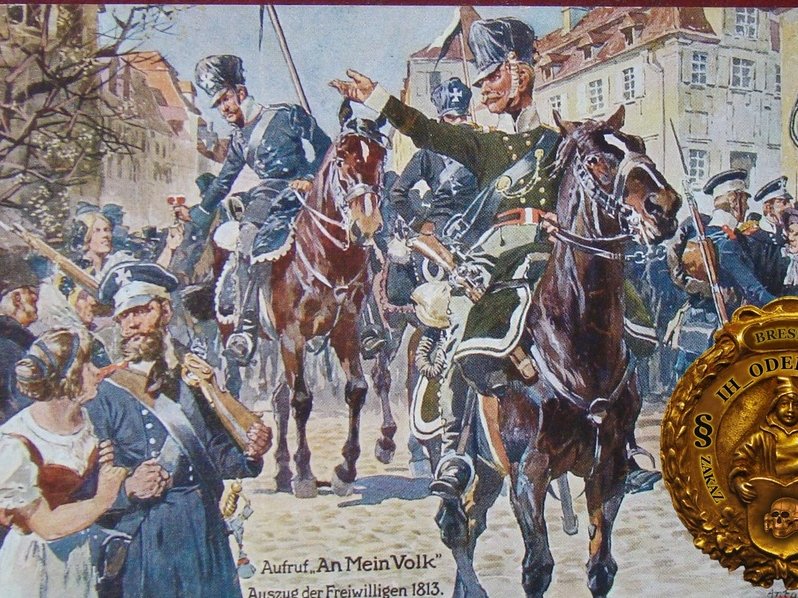
It was still morning when musicians heralded their arrival, throwing the Berliners into unbridled joy. Yorck, with Wittgenstein and Repnin by his side, went to place himself at the head of his troops.
The infantry, with their commander Kleist still in Breslau, followed.
The infantry, with their commander Kleist still in Breslau, followed.
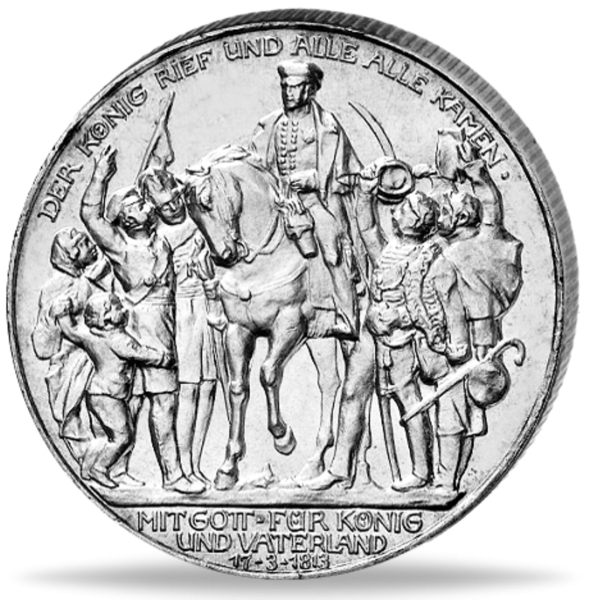
They were spearheaded by the East Prussian Jägers and the Leib-regiments, which had served in Russia. The next were the 1st and the 2nd East Prussian Regiments, the Colberg Regiment under Major von Steinmeß, and the 5th West Prussian and the 6th Silesian Regiments.
The artillery of 63 cannons and 16 guns, under Major Schmidt, were here and there, accompanying different infantry units.
At last, Yorck's corps of 18,000 men and 6,000 horses were in Berlin, with the women ecstatically throwing their handkerchiefs at the soldiers.
At last, Yorck's corps of 18,000 men and 6,000 horses were in Berlin, with the women ecstatically throwing their handkerchiefs at the soldiers.
The commander rode through his troops, whose black shakos and bayonets glistened formidably as if ready for an imminent battle. Placing himself at the head of his troops, he went to return all the salutes, among them Seydlitz's.
The parade continued through the Old Königstraße (King's Road) and the bridge of Kurfürstenbrücke, the present-day Rathausbrücke. As they went to the Berlin Palace, all the princesses went out on the balcony and shouted, 'Welcome!' 
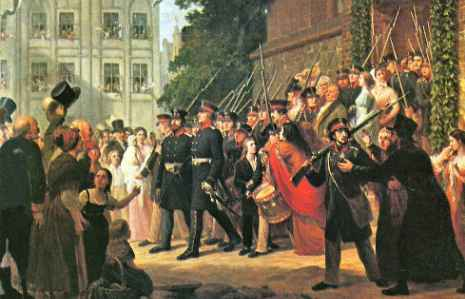
The city went to indulge in festivities, including a ball hosted at a theater. The stoic general, however, remained callous to all of them, for he still had an unresolved concern; he received the king's final refusal to let him keep Seydlitz.
(Forster; Droysen)
(Forster; Droysen)
Major August Hiller von Gärtringen, introducing himself as the new Chief of Staff in place of Seydlitz, cheerfully greeted the general. Yorck, however, bitterly barked:
"I no longer need an aide since my friend was taken from me."
(Schneider)
"I no longer need an aide since my friend was taken from me."
(Schneider)
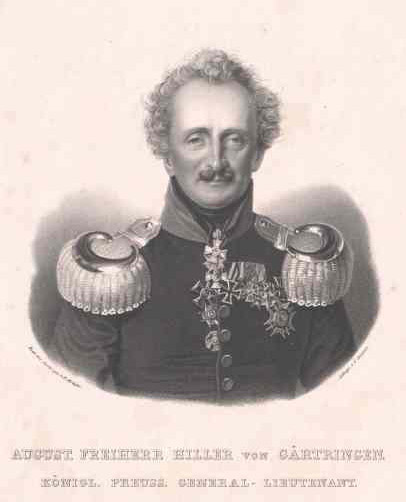
Notwithstanding his brusque reception, the Magdeburg-born officer replied with courteous cynicism:
"I was just as little pleased to become adjutant to Your. Excellency, but I will gladly participate in this war against the French...as a drummer."
(Ibid)
"I was just as little pleased to become adjutant to Your. Excellency, but I will gladly participate in this war against the French...as a drummer."
(Ibid)
Yorck reluctantly admitted him. Later, Hiller recounted that "One had to fight for Yorck's trust," for "so inaccessible was he." He had "only passed the acid test under the iron man's eyes," to be "used by him as a good tool, as hammer and hails against the enemy."
Years of experience had left Yorck with an inner circle of trustworthy generals for Gärtringen to compete with. His favorites werre Schmidt, before whose eyes "the most complex of things became clear," as well as Valentini and von Rohr.
(Gärtringen; Forster)
(Gärtringen; Forster)
Submitting himself to the King's will, Yorck wrote a letter thanking Frederick William for taking care of "the embarrassing uncertainty after the Convention," and praised his troops for having endured it as they had during the war, "with the strictest fulfillment of duty."
(D.)
(D.)
That evening, Yorck showed up to the opera house, where a singspiel 'Love and Faith' was performed. As a tribute to his most precious audience, Kapellmeister Reichardt sang Reiterlied:
"Cheers to comrades! On the horse, on the horse!
Into the field, drawn to freedom!"

"Cheers to comrades! On the horse, on the horse!
Into the field, drawn to freedom!"
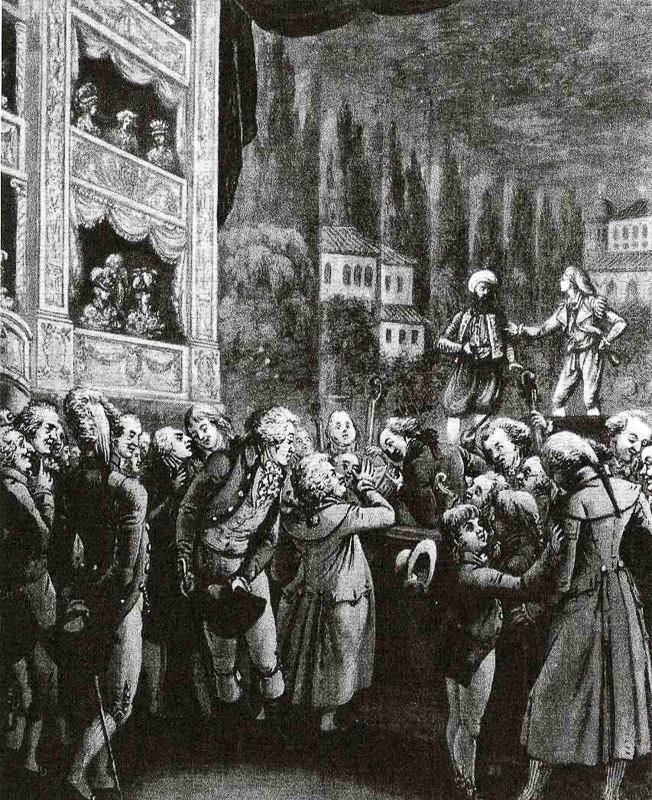
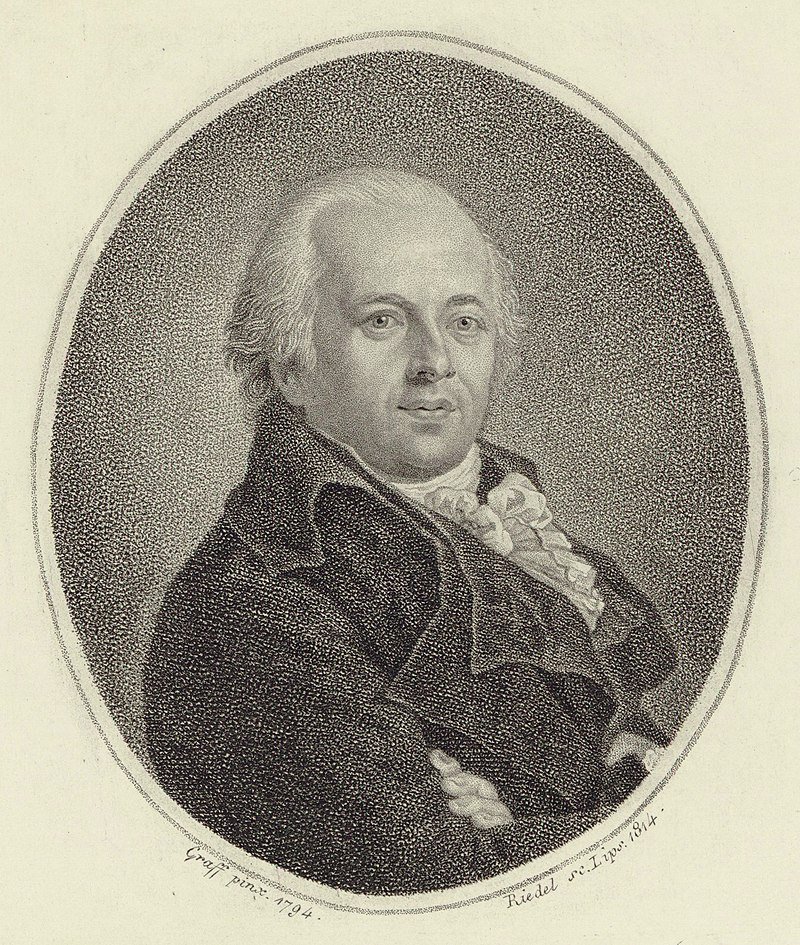
At the end of the performance, a banner inscribed with 'Hail to the Savior of the Fatherland!' appeared on stage, accompanied by the sounds of drums and trumphets.
The entire audience, turning toward Yorck, roared in a standing ovation.
(Forster)
The entire audience, turning toward Yorck, roared in a standing ovation.
(Forster)
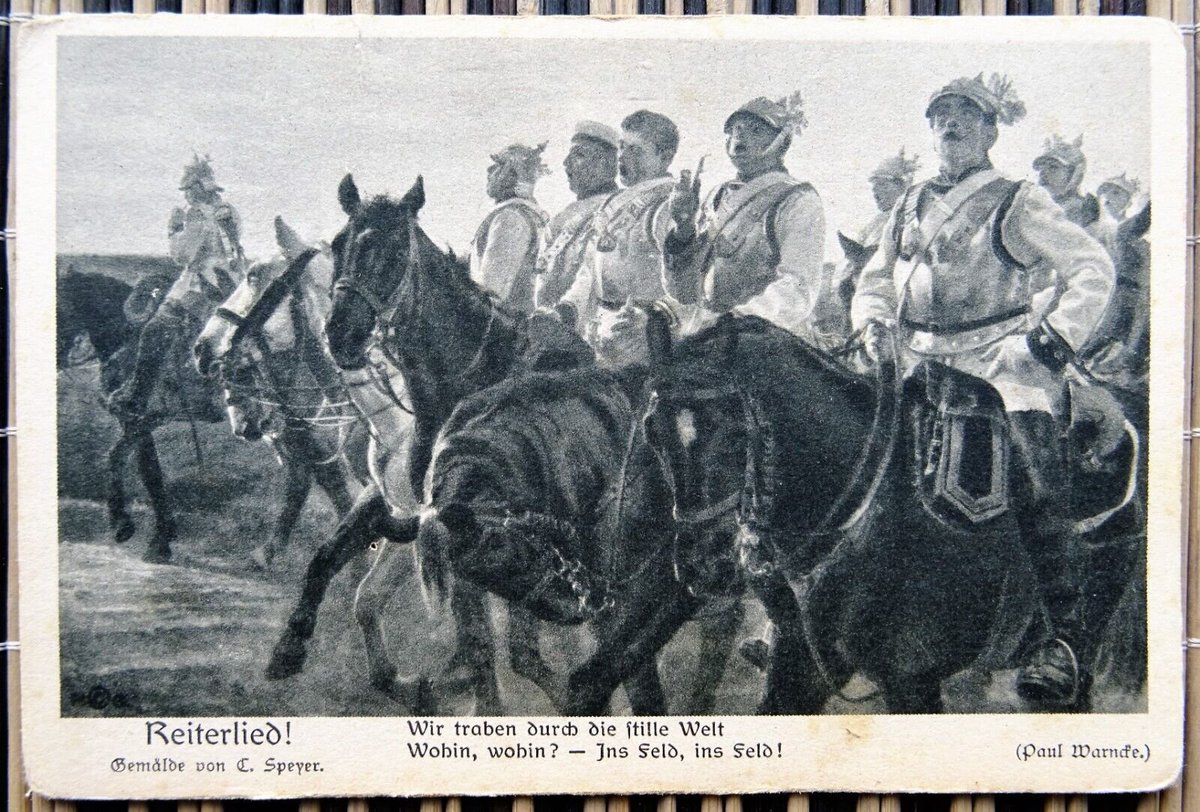
Theologian Friedrich Schleiermacher, titillating, gave out a messianic speech.
It was titled, 'The Return to Truth.'
(Oncken)
It was titled, 'The Return to Truth.'
(Oncken)
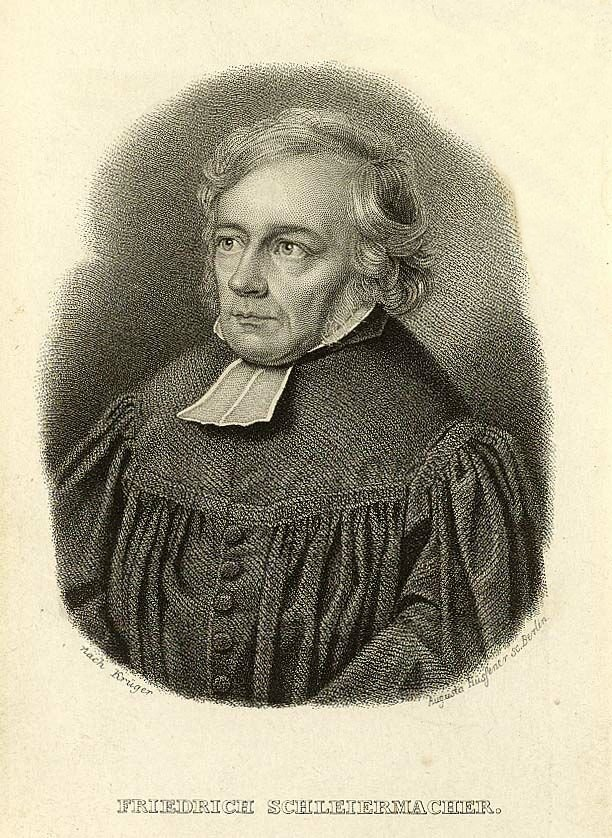
-The End/51 Tweets-
@threadreaderapp Unroll, today is a great day
• • •
Missing some Tweet in this thread? You can try to
force a refresh


